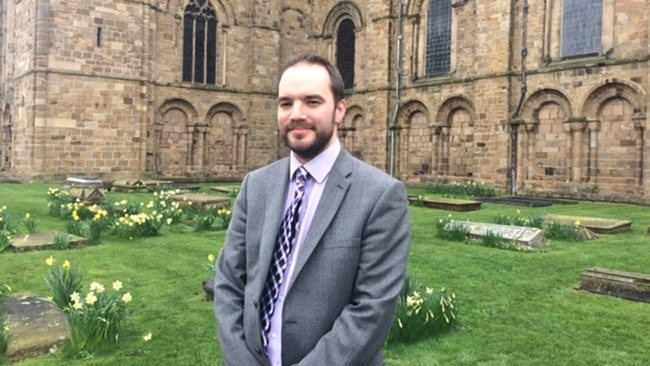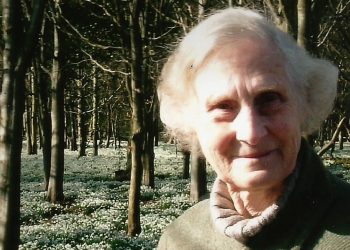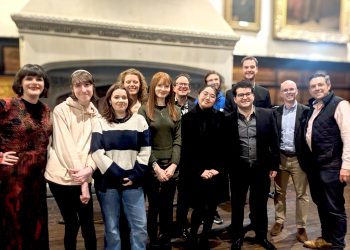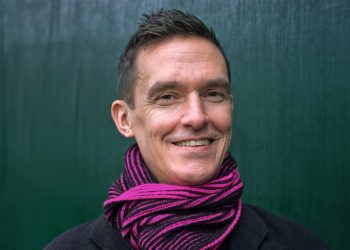Daniel Cook takes up the post of Organist and Master of the Choristers at Durham Cathedral this autumn, succeeding James Lancelot. He is currently sub-organist at Westminster Abbey, but this position at Durham is a homecoming for him, as he grew up in Hartlepool and studied organ with former sub-organist Keith Wright. He told me about his career so far, his musical influences, and his thoughts on returning to the North East for his “dream job”.
JS: What inspired you to take up the organ, and how/when did you decide to make it your career?
DC: When I was eleven we went on a family outing to York. While we were walking around the Minster I kept catching glimpses of the organ and I was enthralled by this mysterious and seemingly forbidden instrument perched on the screen. Later, wandering around the medieval streets, I pondered how someone would go about learning the organ. I asked my mother about it, and she arranged for me to have lessons at our local church. I was fortunate enough to be encouraged not only by my family but also by my first organ teachers, Alfred Peacock, who gave his time so generously and then Keith Wright, who taught me at Durham Cathedral.
JS: How does it feel to be coming back to Durham?
DC: It is quite a daunting challenge, actually! Durham represents my dream job. It is the ‘home’ cathedral not only for me but also my wife who was born in Durham. The architecture is inspirational and as our spiritual home we feel blessed to be returning to the north and giving back to this special place.
JS: At Westminster Abbey, you were presumably involved in some pretty big services – what will you remember most about your time there?
DC: I’ve been associated with the Abbey since I became Organ Scholar in 2002 and over the years I’ve been very fortunate to be able to play the organ for some very special services. The Abbey’s unique place in the history and life of our nation means there is rarely a week that goes by when we don’t do something special. The big occasions are, of course, very enjoyable and I will certainly remember the service marking the outbreak of WW1 as a particularly moving occasion. What I will remember most though is some incredible services in the normal run of things when the liturgy and music have combined to make a Tuesday Evensong in ordinary time really poignant, especially when we’ve been singing Gibbons or Purcell.
JS: How does the handover work? Do you inherit a pre-planned music list to begin with, or do you have to make decisions from day one?
DC: James Lancelot has done a huge amount of work in preparing for the handover, which should make this process fairly pain free, at least in theory. These kinds of positions are most effective when you can take a team approach, so while there will be a lot for me to assimilate initially, I’m really looking forward to working with the other musicians and clergy at the Cathedral who are all very experienced. I’m particularly glad to have the opportunity to work alongside Francesca Massey. She is an amazing musician and it will be invaluable to have someone so accomplished and experienced to work with right from the start.
JS: You’re involved in a number of other interesting musical projects – curator of JAM on the
Marsh and musical director of Mousai Singers – could you tell me a bit more about those?
DC: JAM on the Marsh is a really exciting music and arts Festival based in Kent which I’m curating for the next two years, following on from Paul Mealor. The remit for the festival is fairly broad, but at its heart is JAM’s work as promotor of new music. JAM commissions and performs a huge amount interesting and exciting repertoire every year, and my involvement as conductor, organist and panel member for over ten years, has been really rewarding.
Mousai is a professional ensemble of twelve young singers at the start of their careers, specialising in presenting the whole range the choral repertoire with a small team of virtuosic performers . Recent work has included concerts in the City of London Festival, St Davids Cathedral Festival, JAM on the Marsh, and the Southern Cathedrals Festival. Mousai has collaborated with Onyx Brass, London Mozart Players, the Theology Department of King’s College, London and has an ongoing relationship with JAM.
JS: What are your favourite composers or genres – for conducting and/or for playing?
DC: I have done a lot of recordings championing the work of British Composers which have been really interesting projects. I’ve especially enjoyed researching forgotten works and finding manuscripts in dusty libraries. It’s been so satisfying to make these pieces come off the page and to see them enter the repertoire, sometimes for the first time. One of the most enjoyable projects I’ve done was performing the complete organ works of Messiaen in Salisbury in 2008. I looked in vain for a weak link, but I came away utterly in awe of Messiaen’s genius.
JS: If you could commission any composer to write a new mass setting for Durham, who would you pick and why?
DC: Probably Matthew Martin. I’ve known Matthew since we were both at the Royal Academy of Music, and his career as a church musician, particularly his experience of both Anglican and Roman Catholic Choral foundations, gives him a really fascinating insight into the Mass, and I know he would try to write something which reflected the unique nature of Durham Cathedral and the particular strengths of the Choir. His recent work has been consistently outstanding and his flair for writing for the organ makes him the obvious choice.
JS: A cathedral organist has two very contrasting roles, perhaps more than any other job in music – you’re either out of sight but performing, or up at the front directing. Which bit of the job do you enjoy most, and is it a challenge to juggle these two very different elements?
DC: I think I’m probably quite unusual now in that I enjoy both parts of the job. I’ve always felt that the two elements of the role are interlinked, and for me, one led to the other. Good organ playing needs to be vocal, and include all the nuance of text based phrasing, and good singing needs the rhythmic discipline and academic rigor of good organ playing. I use elements of both all the time, and my particular strengths as a liturgical organist, choral conductor and singer, means that I feel at home in all parts of the job, which is was why I was able to return to playing at Westminster Abbey following on from directing at St Davids. As an organist, I find it incredibly satisfying to get to know the character of the different instruments I’m playing, as each informs the music in a unique way. As a choral director, my work is much more about facilitating the singers to make music – although I enjoy working with adults and student ensembles, my real passion is for training choristers. It’s such a formative time for them, and it’s been so rewarding over the years to have former choristers return and say how much this has meant to them.
JS: What would you say to encourage a child who may be hesitant about becoming a chorister?
DC: Being a chorister is a total immersion experience. The commitment and professionalism they develop is unparalleled and is an excellent foundation for future success in any field. Whilst similar rewards from working as part of a team can be experienced through sport, the skills developed as a chorister can go way beyond this. Choristers receive not only the expected musical training – learning to read music, developing their voice, learning at least two instruments (usually piano and another of their choice) they also develop linguistic skills in Latin, French, German and Italian, liturgical understanding, core strength and stability, and work as young professionals on a daily basis from the age of 8. Alongside this they undertake the full school curriculum and participate in a wide variety of extra-curricular activities too!
Whilst this way of life doesn’t appeal to everyone, for those who are interested I would really encourage them to come along to see what we do. Durham have regular Come and Sing events, and I am always happy to hear someone sing for an informal audition at any time. No prior experience is necessary, just an interest in singing and an lively personality. I’m also happy to talk to parents at any time, both from my professional perspective and as the father of a chorister myself.
JS: Which musicians do you take inspiration from?
DC: I have been incredibly fortunate to have studied and worked with so many inspirational musicians and teachers. I’m so grateful that I was able to study at Durham Cathedral with Keith Wright while I was at school in Hartlepool. Keith was so meticulous and really instilled in me the benefits of a disciplined approach. I was also really fortunate to sing with the Durham Cathedral Consort of Singers in their first year and I learnt such a lot from working with James Lancelot in that year.
The most inspirational people I’ve worked with have been really good at giving not just me, but everyone around them a love of learning, rather than dictating specifics. Nicolas Kynaston and James O’Donnell really stand out as people who continue to inspired me to think for myself and to go off and explore.
JS: Do you have any thoughts to share on the general state of choral music in Britain today?
DC: I think standards in choral music in Britain today are, in many ways, the highest they have ever been. The knowledge and expertise of both choral directors and singers seems to be ever increasing and I am constantly humbled by the brilliance of the young people I work with. Having said that, I think we are sitting on something of a time bomb. While on the face of it, things looks healthy to the outside world, recruitment in an ever more crowded market is becoming a big challenge, especially as parents are reluctant to commit to what they see a specific way of life as early as they once were. All of us who are involved in choral music have a really big responsibility to encourage the next generation of musician to explore singing in choirs. Otherwise, our world renowned choral tradition will be pulled out from under us.
Thank you Daniel for taking the time to answer, and I’m sure everyone in Durham looks forward to welcoming you and your family in the Autumn.








